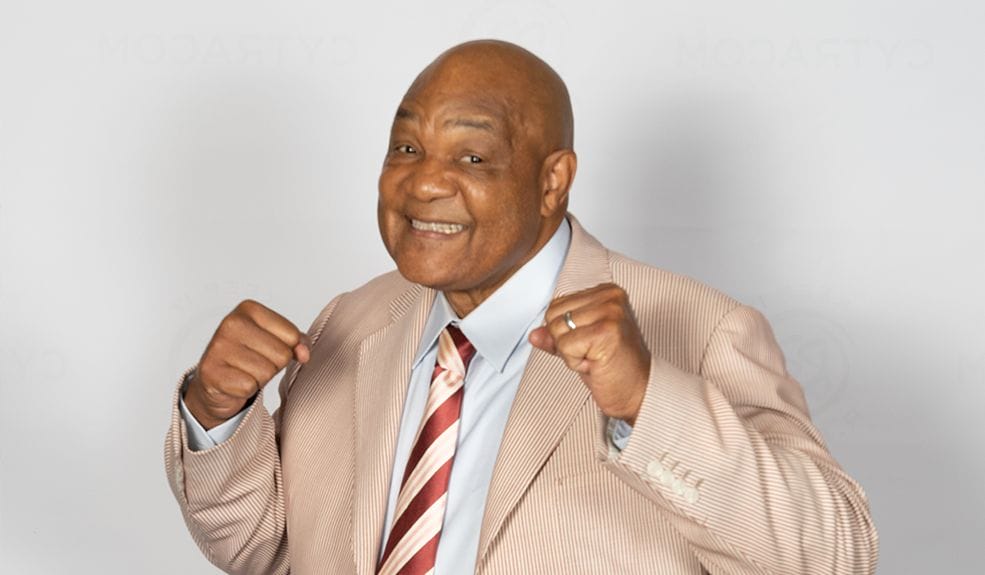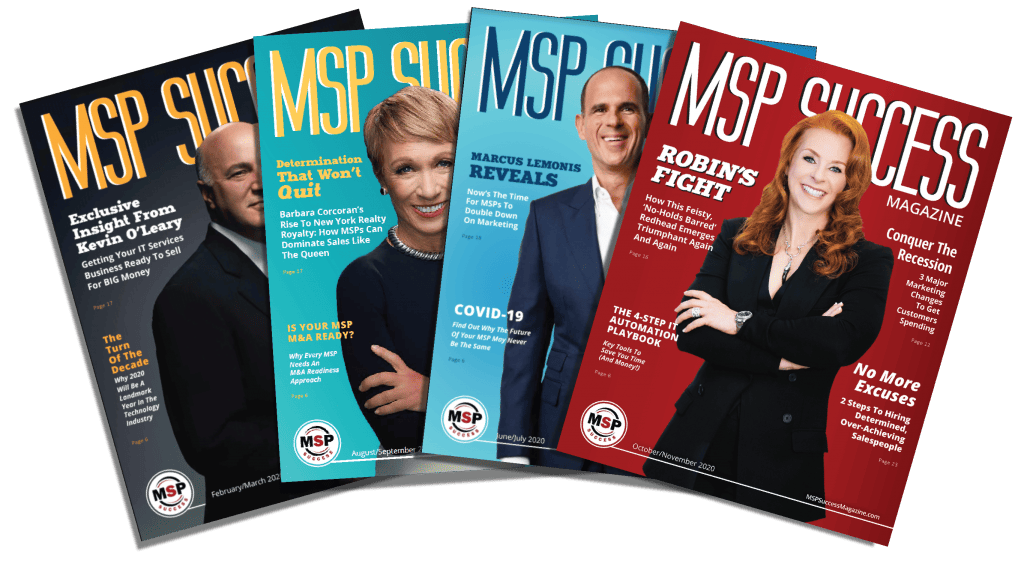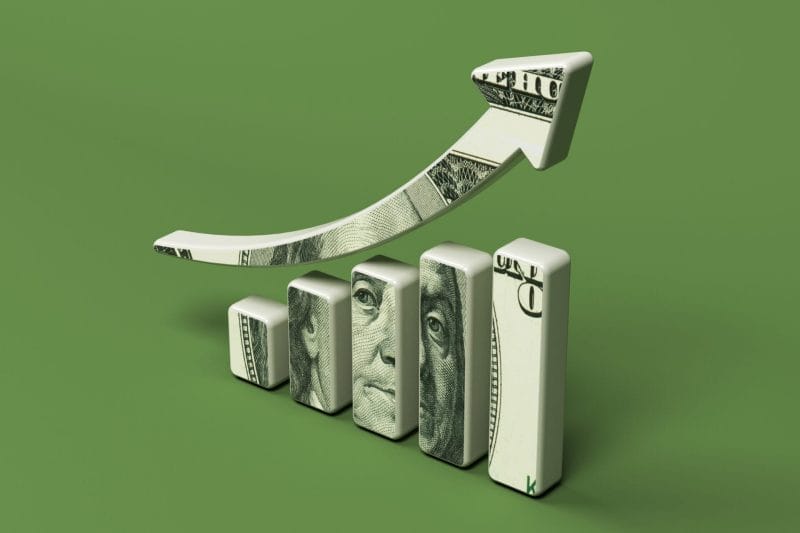George Foreman, the second wealthiest boxer of all time, is a household name today, but he didn’t become one easily. To truly understand and appreciate his resilience, you must look back at his life and the obstacles he’s faced.
The two-time heavyweight champion, Olympic gold medalist, record-busting salesman, author, and serial entrepreneur had a troubled youth in Texas.
Foreman’s father abandoned him, his mother, and his six siblings when Foreman was only 5 years old. Often roaming the streets as a youth, he got into trouble and didn’t like school. Bigger and stronger than most kids his age, he got into fights, lived in abandoned houses, and robbed people. At 15, he dropped out of school. He was street smart, but he could barely read and write.
After being chased by police, he awakened to the truth about the destructive path he was headed down. The next day, he signed up for the Job Corps. “I’d heard a commercial with Jimmy Brown and Johnny Unitas,” Foreman said. “They were great football players, and they said, ‘If you’re looking for a second chance, join the Job Corps.’” There, he learned bricklaying, forestry, and carpentry as well as how to read and write. He sent money to his mom each month to help support his family. He took up boxing as a challenge after listening on the radio to the heavyweight title match when Cassius Clay fought against Floyd Patterson. “I was always trying to be a tough guy and kept getting into fights,” Foreman said. “All the guys in the day room (at Job Corps) said, ‘George, you’re always picking on people, bullying people; if you’re so tough, why don’t you become a boxer?’”
He moved to California, met a boxing coach for the first time, and started learning how to box at the gym. After a couple weeks, the coach matched him up with a light heavyweight. “The guy was so skinny, and I told every friend I had to please come down and watch me,” Foreman said. Expecting to win, he was instead humiliated and decided to quit boxing. “The kids at the gym just laughed me out,” Foreman said. A few weeks later, the trainer ran into Foreman on the street, asking him where he’d been. Not wanting to admit the real reason, he made up an excuse that he didn’t have shoes to box in. After the trainer gave him a pair of boxing shoes, Foreman had no more excuses and returned to the boxing gym.
Only 20 months after his first boxing match, Foreman won a gold medal at the 1968 Olympic Games in Mexico City. He caused controversy among African American civil rights activists after winning when he waved an American flag around the ring. The activists saw this as a way of appeasing the oppressive, white-run society. Foreman told Ebony’s Hans Massaquoi, “I was so proud that I had won. I wanted the world to know that I was from America.”
Hurt by the reaction, Foreman adopted a surly, tough-guy image and became known for his mean facial expressions, which made him unpopular and rejected by the public. Foreman fought his way through the ranks, and in January 1973, he became the heavyweight champion of the world when he knocked out the undefeated Smokin’ Joe Frazier in two rounds. In 1974, he experienced his most humiliating and famous fight. After a 19-month reign in which he was undefeated (40 and 0), he lost to Muhammad Ali in the eighth round of the fight known as the “Rumble in the Jungle.” “I lost the most wonderful position I’d had — the heavyweight title,” Foreman said. “I was devastated. I couldn’t live with myself, so I had to start fighting again to be a champion.” He fought his way back to the top and once again was a No. 1 contender. But then, one night in 1977, after losing a 12-round brutal fight against Jimmy Young, Foreman had a profound religious experience and became a born-again Christian. He retired from boxing as a changed man. He got rid of his luxury cars, several houses, and his pet tiger and lion and started living more of a “regular guy” lifestyle. He preached on street corners, co-founded a small church, and founded the George Foreman Youth and Community Development Center in Houston with his brother, Reid. “For 10 years, I never even made a fist,” George said. “I became an evangelist with the church of the Lord Jesus Christ and never fought anybody.”
But by 1987, because of a series of terrible investments and his former extravagant lifestyle, George was broke. Without enough funding, his youth center faced getting closed, so he made the difficult decision to come out of retirement. When he returned to boxing, reporters made disparaging remarks and accused him of staging a publicity stunt, partly because he’d become a pitchman for products to supplement his income. Despite looking out of shape and past his prime, he began beating younger, fitter boxers. He also displayed his new persona — a pleasant, likable guy with a sense of humor. After 24 wins, including 23 knockouts, he once again contended to regain the heavyweight title and was scheduled to fight Michael Moorer for the World Boxing Association (WBA) and International Boxing Federation (IBF) heavyweight titles. However, the fight almost didn’t take place because the WBA didn’t have Foreman ranked on its list of contenders and remained unwilling to sanction the bout. The promoters even canceled the fight. But Foreman took it to court and won. The presiding judge said the WBA acted “capriciously” in not sanctioning the fight, and as long as Foreman obtained medical clearance from Nevada doctors, he was eligible to fight for the WBA title.
In 1994, George Foreman shocked the world when he became the oldest heavyweight champion, winning back his title after losing it to Muhammad Ali 20 years earlier. Foreman was 45 years old and spent most of the match getting beat by the 26-year-old, undefeated Michael Moorer, who had physicality and youthful energy on his side. But in the 10th round, Foreman used his power to knock out Moorer in one of the most memorable moments in sports history. Foreman defended his title three more times. Out of his 81 career fights, Foreman posted 76 wins and 68 knockouts. He’s been inducted into the World Boxing Hall of Fame and International Boxing Hall of Fame and is rated the eighth greatest boxer of all time.
As a result of winning the heavyweight championship a second time, Foreman received countless endorsement offers and became a successful entrepreneur, building an empire outside of the ring. He became a brand ambassador for several multinational companies, including McDonald’s, Doritos, Nike, and KFC. He spent over a decade promoting Meineke Car Care Centers and grew the business to over 1,000 franchises. Considered one of the most successful pitchmen of all time, Foreman made a deal that solidified him as a household name outside of boxing. After Salton Inc. approached Foreman to sell their grill, he made a deal to put his name on it and become their spokesperson. The George Foreman Lean Mean Fat-Reducing Grilling Machine earned him 40% of sales and later, a staggering $138 million to buy the rights to use his name on the grill in perpetuity. Selling over 120 million units, 1 out of every 10 people in the U.S. owns his grill. Between royalties and the buyout, Foreman pocketed a minimum of $250 million from the grill, making it one of the most successful endorsement deals in sports history.
In a private Technology Marketing Toolkit Producer’s Club Meeting, George Foreman shared his biggest lessons learned and how you can become more resilient in the face of adversity.
1. Look For The Positive. Even in the lowest moments, there are advantages. Foreman looked at being at the bottom as an opportunity. “I think you have a major advantage when you start from the bottom because you have nowhere else to go but up,” Foreman said. “And I started from the bottom.”
2. Create Guiding Principles. Principles are the foundation of our beliefs and values and guide our actions. Foreman’s life changed positively when he found his principles one night after robbing someone. Being chased by the police and dogs, he climbed under a house, where he covered himself from head to toe with sewage water from busted pipes under the house so the dogs couldn’t smell his scent. While hiding, he thought about a speech his mom had made about not having a thief in the family. “I was so scared,” Foreman recalled. “I realized for the first time I was a thief. I thought to myself if I can get from underneath this house and the police don’t grab me, I’m never going to steal anything from anyone again. After a while, the sirens passed, and I crawled from under that house and said, ‘That’s it.’ … I had been on the journey of my life, and I never stole anything again because I had something I’d never had before: principles. I had a badge of principles, and I knew if I could come from that bottom, I can make it all the way to the top.”
3. Fight Through The Tough Times. Real champions fight hardest when faced with adversity, and they never give up. Foreman learned this lesson after returning to the gym following his first loss. This time, Foreman learned how to box extremely well, so his trainer entered him in the Golden Glove fight. When the bell rang in the second fight, his opponent, Winters, hit Foreman so hard that he went down and became dizzy enough that one woman appeared to look like eight women wearing the same outfit. As he heard the referee count down, one or two of the women would disappear with each count. “I remember there were only two left, so I thought I should get up before they all left,” Foreman said. “I jumped up, and I thought I’m going to put this boxing and bobbing and weaving down for a moment and just fight this guy … I turned into a windmill and the next thing you know, I won the boxing match. I learned that sometimes, you just gotta fight. All the rules you’ve got to play with, and your skills are nothing. You’ve just got to come out and swing and fight.”
4. Always Stick To Your Convictions. Your convictions are what matter to you the most and signify to the world what kind of person you are. When Foreman became a boxer the first time, he did it for glory and fame. Declaring his convictions changed his motivations and his life.
After losing the fight against Jimmy Young, Foreman found himself in the fight of his life. In the dressing room, bleeding from his forehead, hands, and feet, Foreman began having a conversation with himself, justifying that he didn’t need to worry about the match. During his internal conversation, he reviewed all he had — a big television contract, a home, horses, a Rolls-Royce, and all the money he needed. Telling himself he could retire, he heard an unexplained voice that said, “and die.”
“After a while, death multiplied in my conversation,” Foreman recalled. “I realized I was about to die, and I didn’t know what to do … I was in this dark space. Over my head, under my feet, and around me was absolutely nothing. If you multiply every sad thought you ever had in your life, that’s where I was in this dump yard of nothing. I got mad … I said, I don’t care if this is death, I still believe in God … that’s when someone grabbed me, a hand pulled me out of nothing. I was alive in that dressing room … and I wasn’t afraid anymore. I saw blood on my hand and my forehead, and I was screaming, ‘Jesus Christ is coming alive in me.’” Foreman quit boxing, became an ordained minister, and began sharing his experience. “The lesson I learned was conviction,” Foreman said. “You’ve got to believe in something. It doesn’t matter how powerful and wealthy you are if there’s no guide.”
5. Be Humble. Foreman recalled being overconfident when heading into his fight with Muhammad Ali. He’d expected to knock Ali out in one or two rounds and didn’t study Ali’s fighting strategies. He never looked at a newspaper or watched an interview that Ali did. If he had, he would have heard Ali explain exactly how he planned to beat Foreman and could have adjusted his own boxing strategy.
6. Give People Something They Want. Don’t be discouraged if people don’t buy from you. Figure out what they want and give it to them. When George became an ordained minister, he began preaching on street corners at a friend’s suggestion. But nobody would stop to listen to him. “This broke my heart,” Foreman said. “After a while, I realized I’m going to make these people stop and pay attention to me.” He began telling his boxing story about beating Joe Frazier, which brought people in droves. “I learned how to sell myself on that street corner,” Foreman said. “You can’t be shy. You can’t let it break your heart; you just got to say the next one will stop. I found out it’s not easy to make someone stop on the street and listen to you unless you’ve got something for them, and I had something — that story.”
7. Be Proud Of Yourself. Don’t let ego get in your way. Foreman learned not to shy away from his beliefs. If someone rejected him, he said a kind word. “I didn’t want anyone to know that George Foreman was on the street corner preaching,” Foreman said. “I decided I’m going to be proud of this.”
8. Learn To Sell. When Foreman went back into boxing, he was getting a lot of criticism in the newspaper and on TV. Reporters were making jokes about his age and weight and talking badly about him. Foreman investigated buying newspaper ads to promote himself, but when he discovered a full-page ad in USA Today was almost $100,000, he decided he needed to learn to appreciate the criticism. “I learned to play with it,” Foreman said. “I’d talk my head off when I’d get on television. I learned to sell George Foreman, the boxer, and Madison Avenue started to pay attention.” Foreman did commercials for Pepsi-Cola, Doritos, hotels, Meineke, and so on. After selling a lot of products for other people, a friend suggested he get his own product to sell. This is how he came to partner with Salton, Inc. for the George Foreman grill. “We did an infomercial and talked about how it worked,” Foreman said. “I’d see people at the airport, and they’d yell, ‘We love you, George.’ … They loved the grill, and it started to sell. I would mention it everywhere. I was a favorite of Jay Leno, David Letterman, and all those guys. They’d invite me over and want to make fun of the grill. I’d bring one over, and I’d cook on their show. It became the talk of the town because I sold it.”
9. Don’t Destroy Someone Else To Make Yourself Look Better. Foreman refuses to tear down another person. When shooting the first infomercial for the George Foreman grill, the script put down competing products. “I looked at the script and said, ‘Nah, I’m not going to do that,’” Foreman said. “I’m not going to tear up someone else’s product just to make mine good. We’re going to make it good. We’re not going to destroy anything that someone else is working on to make my products the best. It’s got to be the best because it is. They took my advice and said, you were right, and I said, ‘No, THAT is right.’”
10. Be Kind. Foreman was inspired to change to a likable person after observing how kind people were to him. “They didn’t care about money,” Foreman said. “They just liked me … and they treated me so nice. You don’t have to be the champion of the world. You don’t have to be rich or have a nice custom car. People are kind to you. I wish I would have known that when I was champion of the world; I would have treated people so much better.”
Experience taught Foreman that people buy you, not your product or service. “It doesn’t matter what you have,” Foreman said. “People buy you. So don’t hurt anybody. Don’t disappoint everybody. If you meet that expectation of yourself, then they’ll buy your product because they feel like they’re buying you. Be the nicest human being in the world, not the second nicest. Find out who’s the nicest and see what he’s doing so you can ‘out nice’ him — and you can sell anything.”
Foreman’s journey has taken him from poverty to being a multimillionaire to being broke and back to where he now has a $330 million net worth. He’s displayed courage and resilience and says without principles, fight, and conviction, “You’re not fit. No one is going to give you anything. I never let anything discourage me. As long as I have my principles, my fight, and my conviction, I can succeed.”
His positive attitude and belief that the best is yet to come reminds him to be thankful and that bad times don’t last forever. “Every day, I put my feet on the ground and be thankful for that day and happy I’m alive,” Foreman said. “Because there’s a possibility of me doing great things if I can just stay alive this day.”
Check out this inspirational clip from Robin Robins interview with George at one of our 2021 Producer’s Club meetings at MSPSuccessMagazine.com/george.












